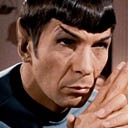Book Review: Beyond Good and Evil by Friedrich Nietzsche
Nietzsche is one of a set of writers who has loomed in the background of my thinking for many years like some sort of specter in spite of my never having read him directly. You can feel his influence on a range of philosophers such as Carl Jung, Martin Heidegger, Jean-Paul Sartre, Ayn Rand, Oswald Spengler, Albert Camus, and numerous others. Most prominently Nietzsche takes the blame for the rise of Nazism in post WWI Germany because of his concept of the “Ubermensch” and his writings on Jews.
In the 21st century we see a renewed interest in Nietzsche in art and politics. There is the dissident right “BAP” movement as one example. In the mainstream there is the ubiquity of superhero movies as another. In an increasingly divided culture the idea of “will to power” and transcending once commonly held moral conventions only becomes more and more prominent. Thus it seemed to me that now is the best time to actually sit and read one of Nietzsche’s works cover to cover.
I am glad I did. Beyond Good and Evil is worth your time both for its virtues and its flaws. It’s the sort of book you really have to wrestle with at times. There is a temptation to give up on Nietzsche solely because of his insufferable rhetorical style. In fact Nietzsche gives readers many good reasons to dismiss him. Whether its is anti-Christian ideology, his regressive view of women, or just his sheer arrogance — readers can perhaps be forgiven for finding him exhausting. However if you are patient and take the time to process each section, you will find a lot of edifying analysis from a consistently innovative mind.
In my own case I just found the style of his argumentation really off-putting. He does not construct his arguments logically in any sort of formal inductive or deductive manner like Aristotle for example. He doesn’t define his terms, doesn’t lead or end with a cohesive thesis, and doesn’t even really try to thoroughly argue any point in particular. Rather his style consists of a lot of long meandering sentences filled with drive-by unsubstantiated claims, broad assertions, name-dropping, French or Latin phrases (that you have to stop and look up), and little amused asides to himself. He spends a great deal of time attacking numerous other thinkers who came before him in a rather glib manner. He spouts a lot of generalizations about Germans in all parts of the book making the arguments feel a lot less universal. If the medium is the message, then I would give Nietzsche an “F” for his unforgivable Reddit-ness — his deeply self-involved masturbatory air that seems designed to appeal to “literally me” midwits.
Lack of humility always gets under my skin and can be a distraction when trying to fairly critique something. If I put aside that bias and just take what Nietzsche says at face value, I find a lot worth seriously examining. His views on religion, while contrary to my own as a practicing Christian, are not easily dismissed in light of the entire history of the Church in the 20th century. The idea of master/slave morality is a useful lens for understanding modern liberalism and its crusade to somehow eliminate suffering.
Perhaps his most fundamental idea — his belief in aristocracy and “higher orders” of men — is not really controversial to me. Rank is fundamental to the human condition. Human societies have always had subservient classes and small groups of elites. We still very much do. The problem in many western countries today is the dishonesty and hypocrisy of elites that have no loyalty to their homelands and wish to pretend they are not among a privileged class.
It is easy to see how many can find Nietzsche inspiring when he speaks of daring innovative men who transcend weak modern conventions of good and evil. His vision of an aristocracy cognizant of noble obligations to its inferiors and boldly inventing new ideas, philosophies, and art speaks to something profound in all men’s souls. However the trick is in the interpretation. As history has shown even the best ideas can be interpreted and utilized in the worst ways. For now I can say I am intrigued enough to read more Nietzsche and go a bit deeper into his vision, eye-roll inducing writing style be damned.
Grade: B
